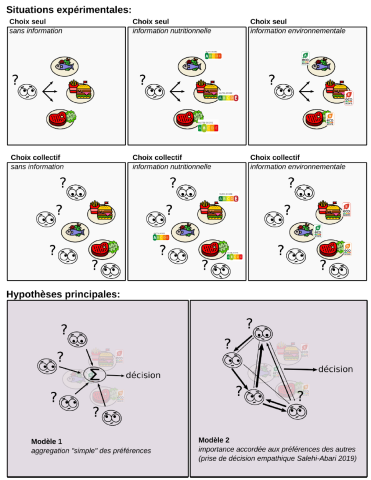
How do social influences modify the effects of nutritional or environmental food information policies?
In the face of climate change, injunctions urging consumers to make the transition to a more sustainable diet are becoming increasingly frequent. The aim of this thesis project is to understand how social influences amplify or attenuate the effects of information policies concerning the nutritional or environmental aspects of food.
The first part of the thesis will draw on the tools of cognitive science and experimental economics to assess the effect of direct social influences on product consumption decisions by consumers in the presence or absence of nutritional or environmental information. The aim will be to characterize the respective shares of consumer preferences, their perception of the norm and the direct influence of the social context of consumption in consumption decisions.
The second part of the thesis will focus on understanding the mechanisms leading to group consensus for sustainable food choices, in the presence or absence of information and as a function of social context. The aim will be to determine whether consensus-building can influence future behavior through changes in consumer preferences. This work will be carried out by comparing computer models that attach varying importance to the satisfaction of individual or group preferences, with observational data on food choices obtained in focus groups or in real food choice situations.
The answers provided in the thesis could guide the development of new public policy instruments that rely more on the dynamics of social influences to facilitate the food transition towards more sustainable consumption patterns.
Presentation of the experimental situations studied and the main hypotheses tested in the thesis: We aim to understand how, during decision-making, the group can affect consumer behavior, particularly in response to nutritional or environmental information. After conducting observations (in real-life conditions) of food choices made by individuals alone or in groups, and with or without nutritional or environmental information, we will establish predictive models of food decisions in order to reproduce as accurately as possible the decisions observed in real-life situations. To this end, we will use computer simulations to test several consensus-seeking models. Our main hypothesis is that models that take into account each member's sensitivity to the preferences of others (empathic decision-making) are better at predicting the decision resulting from consensus-seeking than "simple" aggregation models of group members' preferences.
Informations
- Thesis directo: Nicolas Darcel (PNCA), Sabrina Teyssier (GAEL)
- Supervisors: Cristina Manfredotti (MIA), Paolo Viappiani (LAMSAD), Patrick Taillandier (MIA)
- Financing: INRAE département ECOSOCIO et C-BASC
- Doctoral school: ABIES

